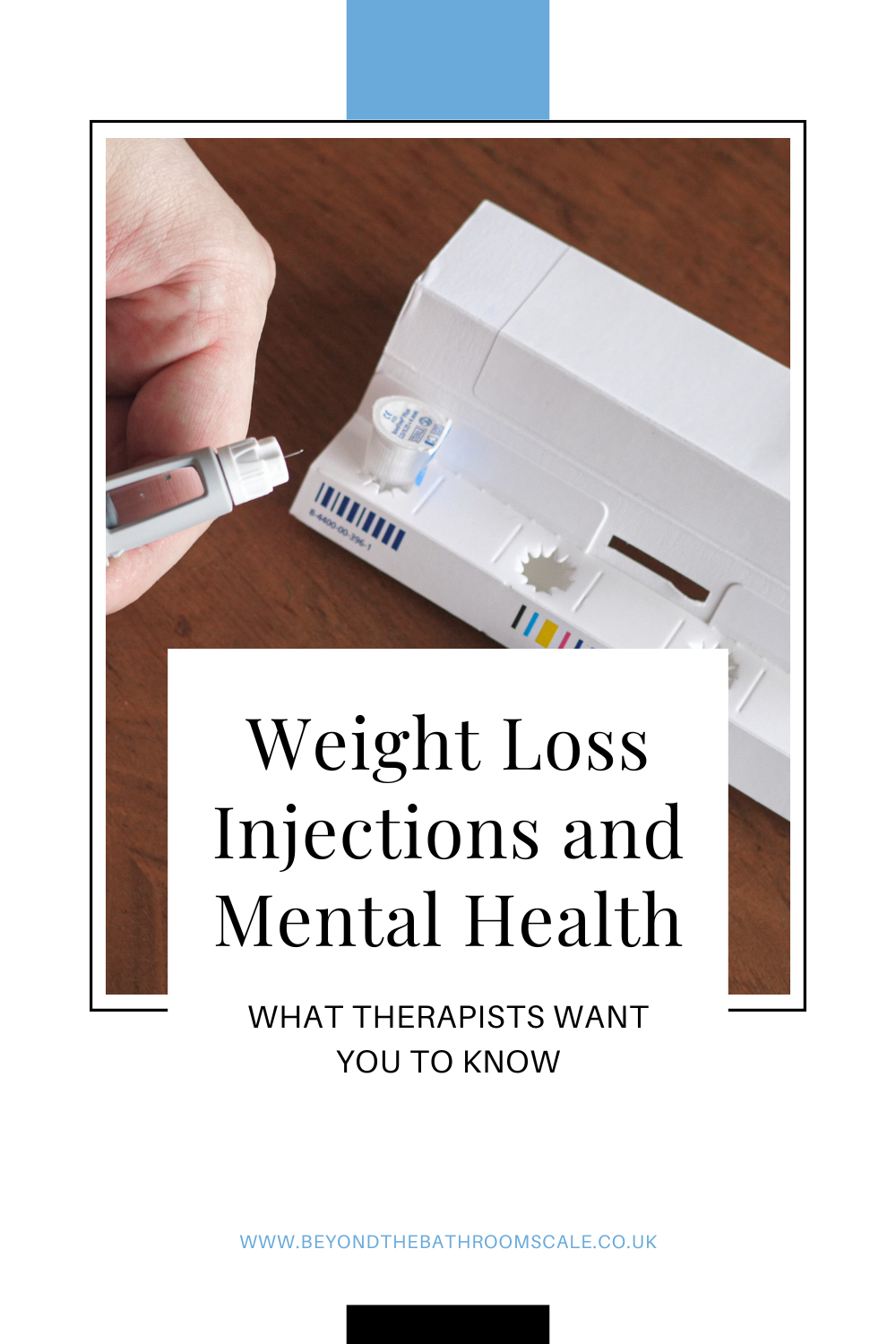Weight Loss Injections and Mental Health: What Therapists Want You to Know
In recent years, medications like Ozempic, Wegovy, and Mounjaro, originally developed for managing type 2 diabetes, have entered the spotlight for their significant weight loss effects. Known medically as GLP-1 receptor agonists, these injections are now widely prescribed, both privately and through the NHS, for people with obesity and weight-related health concerns.
But while much of the conversation has centred on weight loss and physical health outcomes, there’s a quieter, more complex story unfolding in therapy rooms: the emotional and psychological impact these medications can have, especially for those with a history of disordered eating, body image distress, or internalised weight stigma.
As a trainee therapist specialising in eating disorders and body image, I’ve seen how GLP-1 medications can bring up a range of feelings: hope, shame, fear, grief, and even disorientation. This blog post explores what I believe clients (and clinicians!) should consider when it comes to the mental health side of weight loss injections.
1. Body Image Doesn’t Automatically Improve With Weight Loss
Many people hope that changing their body will improve how they feel about it. And while some individuals report a temporary boost in confidence, others are surprised to find that old insecurities persist—or are even replaced by new ones.
Why? Because body image is about how we feel in and about our bodies, not just what our bodies look like. When weight loss becomes the main vehicle for self-acceptance, any weight regain or plateau can feel devastating. And for some, rapid body changes can feel alienating or even triggering, especially if they've lived in a larger body for most of their life.
2. The ‘Success’ Narrative Can Reinforce Shame
Weight loss injections are often framed as a success story: transformation, control, discipline. But this narrative can feel deeply conflicting for people who have spent years trying to unlearn diet culture or heal from disordered eating.
If you’re taking a GLP-1 medication, it’s not unusual to feel caught between two worlds—the part of you that’s grateful for the reduced appetite or changes in health markers, and the part that worries you’re “cheating” or betraying values of body acceptance.
Therapists often hear clients ask: Does this mean I’ve failed intuitive eating? Am I doing something wrong? Why do I still feel anxious or disconnected from my body even though I’m losing weight? These are not signs of failure—they’re signs of a complex, very human response to navigating a weight-obsessed world.
3. Food Avoidance Can Mask Disordered Patterns
GLP-1 medications work, in part, by suppressing appetite and slowing digestion. For some, this is a relief. For others, especially those with a history of restrictive eating or chronic dieting, the effects can feel eerily similar to past disordered behaviours.
Skipping meals, avoiding food altogether, or feeling unwell after eating can become the norm, not because of renewed discipline, but because of side effects. It’s crucial to remain curious: Am I eating less because I feel genuinely full, or because I’m afraid to “undo” the weight loss? A neutral, compassionate awareness of your food relationship is key here.
4. The Pressure to ‘Keep the Weight Off’ Can Fuel Anxiety
GLP-1 medications often come with the disclaimer: “The weight may return if you stop taking it.” This can create a lingering anxiety, especially for those who internalise weight regain as failure or moral weakness.
Some clients describe feeling “trapped” in a long-term medication plan they didn’t anticipate. Others experience panic at the thought of their body changing again. Therapy can be a space to unpack these fears, explore body grief, and cultivate a sense of identity that isn’t tethered to a number on the scale.
5. It’s Okay to Feel Conflicted
You can feel relieved and uneasy. Empowered and uncertain. Proud of your progress and unsure how to talk about it with others. There’s no one “right” way to feel about using GLP-1 medications.
In therapy, we often talk about holding two truths at once: I’m grateful for the health benefits this medication offers, and I’m also noticing how it’s stirring up old beliefs about control, worth, or visibility. Naming those truths can be an important step toward integration and self-compassion.
A Final Word
This post is not for or against the use of GLP-1 medications. It’s here to offer a space for nuance—for the feelings that often go unspoken in mainstream narratives about weight loss.
If you’re taking a medication like Ozempic, Wegovy or Mounjaro (or considering it), know that you deserve support that honours your whole self, not just your weight. That includes your relationship with food, your body, and your sense of self-worth.
You are more than your BMI. More than your appetite. More than a before-and-after photo.
And if this journey is bringing up complicated emotions, you’re not alone. Therapy can help you make sense of it all, with kindness, curiosity, and care.
You’re Not Alone—Support Is Available
If you're taking a GLP-1 medication like Ozempic, Wegovy, or Mounjaro and want to feel more grounded in your relationship with food and your body, I’ve created a coaching workbook designed just for you.
The GLP-1 Coaching Workbook offers therapeutic reflections, journaling prompts, and body image tools to help you explore:
How your relationship with food is shifting
What body changes are bringing up for you emotionally
How to stay connected to your values and wellbeing
– All without shame, pressure, or one-size-fits-all advice
It’s a supportive, non-judgmental space to check in with yourself, especially when things feel confusing or overwhelming.
👉 Learn more and download the workbook here.
TL;DR Summary:
GLP-1 medications like Ozempic can impact more than just weight—they also affect body image, self-worth, and eating behaviours. You may feel a mix of relief, anxiety, or disconnection. These reactions are valid. This post explores the emotional complexity of weight loss injections from a therapist’s perspective, offering non-judgmental support for navigating this journey with mental health in mind.


